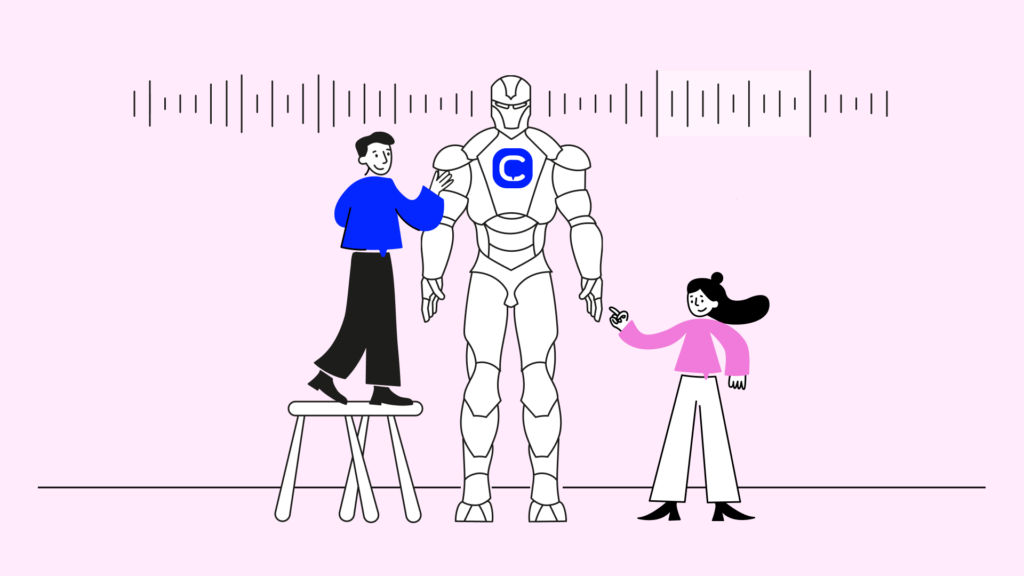CloudTalk’s CEO: Your agents spend half of their time wrapping up calls. Our AI will change that.

While you are reading this article, there’s more than a 50% chance that your agents are writing call summaries or doing other repetitive tasks. You won’t get much business out of that, will you?
In this interview, our CEO Martin Malych shares his outlook on the current state of AI, the future of artificial intelligence in sales and customer experience (CX), and mainly – how CloudTalk is transforming from a calling software to an AI-powered communication platform that amplifies human potential.
AI is here to enhance human potential
“Commoditization of AI will lead the CX industry from task automation to personalized assistants and eventually, full voice automation.”
Martin Malych, CEO
People have quite diverse opinions on the rise of AI for businesses – some are fully for the idea of AI helping us work better, and some have doubts. What is your opinion?
As I see it, artificial intelligence is definitely here to help us succeed. Over the past year, we saw AI writing poems or reasoning through hard problems. Even building simple games. It creates a huge opportunity for many areas – not only for technology.
By using the full potential of AI, we are transforming the way we work. AI can enhance the human mind by taking over mundane tasks so people can focus on more meaningful ones and succeed in areas where they excel.
Talking about AI enhancement, Industries like manufacturing or IT are extremely successful at using artificial intelligence. What about the CX industry – how do you rate the level of adoption?
Customer experience, especially concerning phone calls, is an area quite untouched by AI. So far, it was very hard to build something truly meaningful with artificial intelligence.
But recent AI advancements have improved the adaptation of AI in real-life use cases. Today, we can automate repetitive tasks. We can create complex AI assistants that will help agents provide much better service. Eventually, once we fully understand the implementation of AI in CX, we can proceed to a more advanced level of automation.
With AI getting closer and closer to revolutionizing the way we work, what do you consider the best use case of AI in the CX industry right now and why?
The thing that really fascinates me is how AI can understand language and reason through hard problems. This is a huge advancement that will have a major impact on the communication space. In the future, we can have fully automated voice bots or any kind of solution that can almost perfectly mimic human interaction.
CloudTalk supports human interactions with an AI at the center.
“In a decade, 3 out of 4 calls will be fully automated – but talking is here to stay.”
Martin Malych, CEO
How does AI fit with CloudTalk’s vision for the future?
Bringing powerful artificial intelligence to CloudTalk is one of our top priorities. Why? Because AI can make predictions based on the vast amount of data that humans just can’t. And we already have the data which is the key to building a strong AI platform. It’s an amazing opportunity for us to help transform the CX industry once again.
At the moment, we are focusing on automating repetitive and tedious manual tasks with conversation intelligence. Our research shows that right now, agents spend from 50 to 60% of their time on after-call work. By creating a synergy between the human and machine, we can reduce this time to a minimum, so agents can spend more time talking to customers.
What about the more distant future?
In 5 to 10 years, I believe that 3 out of 4 calls will be fully automated by artificial intelligence. So, our long-term vision is a communication platform where AI has the capability to move humans from customer support lines or business development roles like BDRs, telemarketing, and market researchers into more complex ones, like keeping customers happy or dealing with sensitive problems.
We don’t want to eliminate people from the equation. People will always want to talk. We will simply transform the way they connect by building an AI-powered business communication platform that will be at the center of all customer interactions.
That sounds like a brave new world for business communication. Where is CloudTalk’s automation right now? What is the single best AI feature we offer?
I’m proud to say that we have just released Automated Call Summaries in a private beta version. It’s a tool that automatically creates a complex overview of a phone call once it ends. It creates call notes with the content summary, monitors consumer opinion, and even automatically assigns appropriate Call Tags.
With Automated Call Summaries, sales and customer support can identify the key topics of the call within seconds. What does this mean for users? Agents will quickly understand what was happening during the conversation. CX managers and the RevOps team can monitor whether the conversation was handled correctly, and get valuable insights. They can also save time by reading through a short call summary instead of listening to the whole call recording.
There’s a lot of potential in that. Are there any results you can share already?
Actually, we are running this tool internally on our sales and customer service teams and I have to say — the cooperation between human agents and AI brings amazing results. Call summaries done by AI are performing significantly better and are much more powerful than those done solely by people.
You said call summaries automated by AI are performing exceptionally well. What impact will it have on business?
It will definitely drive people to win more deals, improve customer experience, and take a lot of weight off agents’ shoulders.
Even without AI, CloudTalk helps our customers to increase the deal pipeline by 33%, and almost double the number of calls per agent. We also see a 30% increase in pickup rate for sales teams, and a 34% increase in first call resolution for customer support teams, next to a 47% decrease in waiting time. And all our productivity features combined can save customers more than 2 hours per user every day.
We believe that with AI, we can at least double these results — we are expecting an increase of more than 100%.
An AI assistant may reduce callbacks from 30% to almost zero
“In the next year or two, our artificial AI assistant will provide you with powerful answers within seconds – no more need to escalate.”
Martin Malych, CEO
Are there any other AI breakthroughs on the horizon for CloudTalk?
Once we understand what is happening in conversations, we can create a personalized assistant to improve the way people talk. We’re aiming to decrease average call duration and increase customer satisfaction. If agents had the full context of past customer communication ahead of time, they could handle calls more efficiently.
What AI-powered CloudTalk features do you anticipate sales and customer support will use the most in the future?
It will surely be the AI personalized assistant I mentioned previously. It will help people handle conversations spotlessly in real-time.
Imagine it as an AI assistant — a bot for automated knowledge sharing. It can look through past conversations and a knowledge base in seconds and provide immediate answers.
Let’s say that a salesperson receives a question about a competitor. For example, what is the difference between Salesforce and HubSpot? The AI we are building can supply them with a powerful answer right away.
The same applies to customer support. In 30% of cases, people call support more than once to have their issues resolved. But at least 75% of all questions were already answered in the past. The AI assistant will go through all the data and help agents provide assistance in real time, without escalating. This will boost their first call resolution rate and CSAT will skyrocket.
In that case, what advice would you give to companies who are trying but still struggling to use AI to optimize CX?
From my experience, what works best is allocating at least one person as your AI evangelist. An AI enthusiast who drives adoption and develops use cases of how AI can empower people in your company. This is especially important in startups where you need to grow and move very fast.
My second piece of advice is spreading knowledge across departments — sharing experiences with other teams to increase the AI adoption rate. If someone, let’s say, in marketing is using an AI-powered tool that is working well for them, encourage them to share it with the whole company. One tool can have many applications that you maybe didn’t even think about.
The third and last piece of advice – take full advantage of your data. You probably already have all the resources you need. Use them to evaluate what works for you and create a strong AI strategy around it.
Where no agent has gone before
“In the future I see, AI does the heavy lifting so I can keep building up my vision.”
Martin Malych, CEO
Thank you so much for your time, Martin! Let’s wrap this interview with a slightly unexpected cliffhanger for those who wonder what AI can bring us in the truly distant future.
If you were to think about a (maybe not so) crazy sci-fi scenario in the future of AI, something like a silicon brain that precisely calculates the best decisions for business strategy, what would you fantasize about?
Actually, if there is an endless AI automation possibility in the future, a tool that can read my mind, realize my ideas for me, and bring me results would be great!
For example, if I want to do a competitor analysis, I will just think about it, build up the vision in my brain, and my robot will deliver it.
I’ll still be thinking for myself, but AI will save me time by executing my thoughts.
That is the future I’d like to see. The future where the human mind still strives, but artificial intelligence does the heavy lifting.























